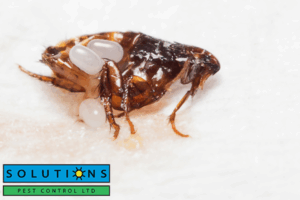Fleas are one of the most persistent and irritating pests for pet owners and homeowners alike. These tiny parasites can cause itchy bites, allergic reactions, and even transmit diseases. But one common question people ask when dealing with a flea infestation is: How long can fleas live without a host?
Understanding the flea life cycle and how long they can survive in various environments is key to eliminating them effectively. In this blog post, we’ll break down everything you need to know about how long fleas live without a host, how they thrive, and when to seek professional help.
Understanding the Flea Life Cycle
To understand how long fleas can survive without a host, it’s important to look at their life cycle. Fleas go through four main stages: egg, larva, pupa, and adult. Each stage behaves differently and requires specific environmental conditions to survive.
- Eggs: Laid on the host, but they often fall off into bedding, carpets, or pet areas.
- Larvae: These worm-like creatures avoid light and feed on organic debris and flea dirt.
- Pupae: Fleas in this stage form cocoons and wait for favorable conditions such as the presence of a host to emerge.
- Adults: This is the biting stage. Adult fleas need blood meals to reproduce.
Understanding these stages is essential for timing treatments and choosing the right approach for flea control near me.
So, How Long Can Fleas Live Without a Host?
Adult Fleas
Once adult fleas emerge from their cocoons, their time is limited if they do not find a host. On average, adult fleas can only survive for 1 to 2 weeks without a blood meal. In ideal warm and humid conditions, some might stretch that to 2 weeks, but they are unlikely to live much longer without feeding.
However, if they find a host (like a cat, dog, or even a human), they can live for several weeks, feeding multiple times a day and laying hundreds of eggs in their lifetime.
Fleas in the Pupal Stage
This is where things get trickier. Fleas in the pupal stage can survive for several months, sometimes up to 6 months without a host, as long as they remain in their protective cocoons. This is why flea infestations often seem to come out of nowhere after a home has been empty for a while. As soon as they detect movement, heat, or carbon dioxide from a potential host, they emerge and start feeding.
Flea Eggs and Larvae
Flea eggs and larvae do not require a host to survive, but they do need favorable environmental conditions like warmth, moisture, and organic material to feed on. Without these, eggs may not hatch, and larvae may not develop properly.
Can Fleas Live in Your Home Without Pets?
Yes. While fleas prefer pets, they can still survive in homes without them especially if there are other hosts like rodents or wildlife. Fleas can also bite humans, although they cannot live on human blood alone long term.
In homes where pets are no longer present but fleas remain, it’s often due to larvae or pupae lying dormant in carpets, furniture, or cracks in the floor. This is why pest control Surrey BC professionals often recommend treating the entire environment, not just the animals.
How Fleas Sense a Host
Fleas are highly sensitive to environmental cues that indicate a host is near. These include:
- Body heat
- Vibrations/movement
- Exhaled carbon dioxide
Even if your pet has been away from home, fleas hiding in your house can detect your movement and jump onto you or your returning pets. If you’ve recently moved into a new home and suddenly notice flea bites, there’s a chance that dormant pupae have just hatched.
Flea Survival on Humans
While fleas can bite humans, they rarely live on us. We don’t provide the warmth, fur, or stable environment that fleas prefer. However, flea bites can still cause itching, irritation, and allergic reactions. If you notice unexplained bites on your legs or ankles, it might be time to investigate further or consult pest control Surrey experts for a proper inspection.
What You Can Do to Control Fleas
If you suspect you have fleas even if you don’t have pets don’t wait for the problem to resolve itself. Fleas reproduce quickly, and their dormant pupae can prolong infestations for months.
Here are steps you can take:
1. Vacuum Thoroughly
Vacuum carpets, rugs, furniture, and baseboards. This helps remove eggs, larvae, and even adult fleas. Make sure to dispose of the vacuum bag outside your home afterward.
2. Wash Bedding and Pet Items
Use hot water to wash any fabrics your pets or family use frequently. Fleas can hide in pet bedding, blankets, and even clothing.
3. Use Flea Treatments
If you have pets, treat them with veterinarian-approved flea treatments. Make sure the product you use covers not just adult fleas but also larvae and eggs.
4. Consider Professional Help
DIY efforts can be effective to a point, but flea infestations are notoriously difficult to completely eradicate especially if pupae are present. A professional service specializing in flea control near me can assess your situation and apply targeted, eco-friendly treatments to address all stages of the flea life cycle.
How Long Do Fleas Live Without a Host in Empty Homes?
In an empty home with no people or pets, fleas in the pupal stage can remain dormant for months. Once someone enters the space, adult fleas emerge and begin biting. This is why previously vacant homes can suddenly seem infested once inhabited again.
If you’re moving into a new space and want to avoid surprises, consider a proactive inspection and pest control Surrey BC services before settling in.

Fleas and Climate: Why It Matters
Climate also plays a significant role in flea survival. Fleas thrive in warm and humid environments. In colder or drier conditions, their development slows, and their chances of survival without a host decrease.
That said, indoor environments often provide stable temperatures year-round, allowing fleas to remain viable even during colder months. Regular cleaning and proactive pest control can prevent infestations from gaining a foothold.
About Solutions Pest Control
At Solutions Pest Control, we understand the frustration that comes with flea infestations. Serving Surrey and surrounding areas, our expert team offers comprehensive solutions that address all life stages of fleas. Whether you’re dealing with a current infestation or want to take preventive action, our eco-conscious approach ensures the safety of your family and pets.
We specialize in tailored pest management plans that cover a wide range of insects, including fleas, and our services are backed by experience and a commitment to customer satisfaction. Don’t let pests disrupt your peace of mind visit Solutions Pest Control to learn more or schedule an inspection today.


